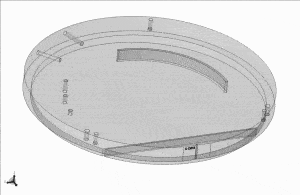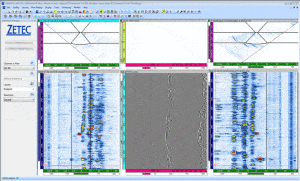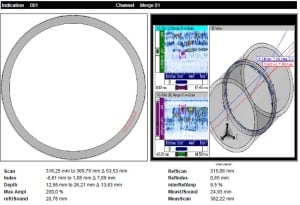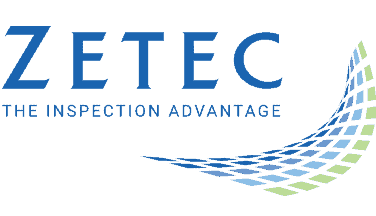KEY FEATURES
UltraVision is packed with powerful features that improve inspection analysis and reporting.
Specimen Settings
- Basic to complex geometries managements: UltraVision contains a comprehensive bank of configurable predefined specimens including connecting pipes, cruciform joints, T and L joints.
- Custom Geometries Handling: UltraVision features a number of ways to create specimen geometry. It has a tool to create specimen geometrymanually and an onboard specimen geometrygenerator, which uses the profile scanned from a mechanical profile gage. 3D Custom specimens can also be produced from .SAT files. Finally, it is possible to import a file from ESBeamTool.
- Overlays: Configurable welds can be added to specimens such as V, mod V, X, J, K. Weld profiles can be imported from ESBeamTool.

Setup Creation
- Scanner Creation Tool: The scanner creation tool allows a user to simulate the probe position and related UT data on 3D component.
- Beam Simulation:
- Advanced PA Calculator: The focal law calculator supports all advanced ultrasonic inspection techniques, including Phased Array Pulse Echo, Pitch and Catch, Tandem mono and dual and conventional TOFD.
- Automatic Probe Detection: Automatic probe detection detects and identifies connected probes, reads probe parameters and serial number and tracks any probe changes.
- Calibration Tools: Calibration tools calibrate the encoder, the time of flight and velocity for TOFD probes, PA wedge delay, sensitivity and TCG. Individual elements are checked in PA arrays. The calibration block is defined and a calibration check report generated.
Views

- View layout: User rights also extend to deciding how data is displayed on the screen. Users can select sectorial, scrolling, Volume corrected (B, C and D), Polar, A-Scan, FFT, 3D, Amplitude or Time of flight C-scans.
- Customization: Predefined custom layout management can also be selected to view customized properties, such as envelop, smoothing units, overlays and links between views where the cursor movement can be linked. There is no limitation to the number of channels viewed.
- Color Palette Editor: A color palette allows amplitude and TOFD data to be displayed according to user preference.
UT Data Acquisition
- UT data acquisition can be 8, 12 or 16 bits and the data file size can be up to 20GB.
- A-scan length can be up to 256000 points per A-scan and every elementary a-scan is captured.
- UltraVision is capable to create and display merged views in real time.
- Mechanical setting allows single point (free running), one line scans, and bi-directional, uni-directional, helicoidally and polar sequences.
- Motorized acquisition: The probe’s positions are controlled from the ZMC2, ZMC4 or MCDU motion controllers. It is possible to collect position information from up to 6 encoders and focal laws can be adapted depending on the probe position. The start, stop and pause of data acquisition are directly controlled from UltraVision 3.
Analysis Tools
- Sizing Tools: Slicing cursors allow easy measurement while the ability to draw contours around indications assists manual sizing. An automatic Dropsizing tool of allows sizing of the indication within the drawn contour using the dB drop method. Echo dynamic sizing is also available.
- Assisted Analysis: Analysis can also be carried out by automatically screening the entire data file and indicating the areas of interest based on specific, user-selected criteria.
- 3D Data Plotting: By synchronizing A-scans and 2D and 3D data, the software can plot indications and create 3D images.
- Volumetric Processing: Volumetric processing involves merging, volumetric merging and smoothing to produce a software C-scan. A 2D specimen overlay in Top, Side and End views can also be applied.
- TOFD Processing: Tools are available for hysteresis correction, geometric echo removal and TOFD Processing (LW Synchronization, LW Removal, SAFT).
Reporting
- Indication Table: The indications’ table is automatically populated by selected information fields and can be exported to a text file.
- User information fields: Configurable user fields can be created to provide additional information in the report.
- 3D views in Reports: Indications are directly plotted on the 3D view of the inspected specimen.


